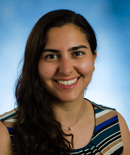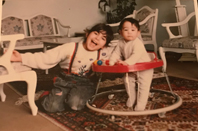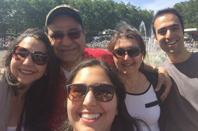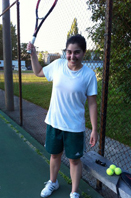Interview with Yalda Shahram, MD
A Conversation with Yalda Shahram, Assistant Clinical Professor
What does Yalda mean? Do you like your name and does it suit you?
It is the longest night of the year, the winter equinox. Its other meaning is rebirth or renewal. I think it matches me, who I am, and it suits me. The proper pronunciation is, "YeahL daa" in Farsi.

Where were you born and raised? Tell me about your parents and siblings, and how your family that sustains you.

I was born and raised, until I was eight, in Tehran, Iran, when we moved to the United States. My sister is five years younger. Although I am close to my family, I ended up attending college away. I talk with my family every day; they are my best friends and we can go to them anytime—and that is how I wish to raise my new family. My husband is also very close with his family and our son will be the first grandchild on both sides of the family and my parents will be moving from Seattle soon to be closer with us. My little sister is remarkable. Like my father, who is a musician, she pursued flute at Berklee but her major was in the business of music and not performance. She's traveled and studied global music management in Valencia, Spain, and because of her musical ear, she speaks Spanish, Greek, Farsi, and English. She then went to law school and now she works for a non-profit in San Francisco. My dad and mom met in the 1970s in Iran, which was a time of revolution and upheaval, and intellectual activity, which was later completely suppressed. My dad had been in high school in Boston and was on track to study music and composition at Berklee, but he returned home to be part of the movement for change in Iran, and that's where they met. My mom is an amazing artist and has painted the cover of one of my dad's projects. My father was an early innovator in the Iranian movie industry, introducing modern instruments like synthesizers and fusing modern instruments with more traditional and folk music and instruments, like the tar. His field was feature films and television. He has just finished a movie for children with songs. Here in the United States, he trains vocalists and musicians, composes music and lyrics. I trained on piano and clarinet, but I didn't have the drive or patience to improve, and now that I am expecting I sometimes play for the baby, but no one else should have to hear me.
What were the circumstances that inspired your family's move from Iran to the US?
As with many immigrants: opportunity. The move was primarily because of my dad's work as things were changing in Iran. Every new movie, every new song has to go through a government body to be publicly played and that process isn't founded on anything logical. For example, there cannot be a single female vocalist; there must be multiple voices. Forcing artists to mold their work to the ideal of the state wasn't ideal for anyone who was creative, but my parents also wanted something different for my sister and me.
Describe the first memory you have of being in the US and how it affected you.
My first memory outside Iran was actually in London and playing with kids our age where it was gray and cold in the summer, full of brick buildings, and smelled of rain on asphalt. In the US, I remember learning to rollerblade with my cousins and falling down a lot. In school, I did half-days of ESL and then joined the rest of the class. Kids didn't understand that I was learning their language, so I would say words that got other kids mad at me and I would cry because I hadn't meant to say the wrong word. I learned English in three months but forgot how to read and write in Farsi. In college, I did a double major in Iranian Studies as part of heritage studies at UCLA, and now I can read and write in Farsi again.
What food do you miss from Iran that just doesn't taste the same here? Who prepares it best and have you been able to replicate it?
If we talk about food, then we must talk about my mother who is the best cook I've ever known. She has creatively replicated everything here in the US. My cooking is good but hers is amazing. I love to cook all the many koresh (stews) that are served with rice, a staple in our cuisine. I really love making tahdig, Iranian rice with a crispy bottom crust and my favorite variation is tahchin, with saffron, egg, and yogurt base so it becomes almost like a little cake. It's a staple that goes with everything.
Whose opinion do you value? What about that person's wisdom reaches you?

I seek the opinion of the people I love and respect: my parents, relatives who have been in health care, my husband, and my sister. As a first-generation immigrant, I learned early on that I needed mentors during the different transitions who have the wisdom and could advise on the experience that I lack. I've relied upon different mentors who I could speak openly with and express who I am. In medical school, the Chair of OB-GYN knew I had no interest in OB-GYN but helped guide me to residency in internal medicine. Finding such people wasn't always logical, but having them was serendipitous and crucial. I am always open to asking people I trust for guidance.
How has a long-held opinion of yours changed with either time or new information?
In 2016, I was very hopeful for Bernie and was disillusioned by an imperfect system, which I didn't feel was working, and my belief was that I shouldn't vote for anyone I didn't support. It was my husband who convinced me that voting is more important than believing that I shouldn't compromise my beliefs. I was born during the Iran–Iraq war and a quote that is meaningful to me is, "Peace is not the absence of war. Peace is the presence of justice." I don't know that we have that yet so we must keep working for something better.
How have politics otherwise impacted you and your family?
This is the first grandchild for both my parents and my husband's. My mother- and father-in-law live in Iran and were able to visit us twice during the Obama years. They are banned from visiting us and, because they are from a Muslim majority country, are considered a threat. They will be unable to come here to see our son, despite that neither is religious. We have reached out to Kamala Harris and Nancy Pelosi, who have responded supportively. There are few exemptions allowed, for example, the Yemeni mother who was allowed to see her dying son after multiple failures. We have changed our lives to accommodate this law and will take the baby to Iran, once he is old enough to travel. This affects so many people like us personally.
Is there anything that you are naturally good at doing?
 Around the time I stopped practicing piano, I was a sophomore on the varsity tennis team. During our senior year, I would have been #1, but a German exchange student was way better than me! At UCLA, I played intramural sports but it became harder to keep up with sports, academics, and other demands. In med school, in New York, the weather isn't conducive to playing tennis year-round and there aren't free tennis courts. My husband didn't know how to play tennis at first and, during one of my visits to Iran to see my grandmother, he took lessons and surprised me by playing competitively when I returned.
Around the time I stopped practicing piano, I was a sophomore on the varsity tennis team. During our senior year, I would have been #1, but a German exchange student was way better than me! At UCLA, I played intramural sports but it became harder to keep up with sports, academics, and other demands. In med school, in New York, the weather isn't conducive to playing tennis year-round and there aren't free tennis courts. My husband didn't know how to play tennis at first and, during one of my visits to Iran to see my grandmother, he took lessons and surprised me by playing competitively when I returned.
When do you procrastinate? What do you do everything in your power to avoid?
Some house chores like laundry come to mind, but this is something I really dislike: I save all of my medical school binders and papers from residency. They are good information but they take up space. My husband has been hoping that I would scan and save really relevant things but I’ve been avoiding doing so—it's been on my list of TO DOs for years.
"I speak and think in no single language." Even so, do you find that Farsi articulates concepts that may not be translatable in English?
Farsi is more formal and descriptive of family relations, for example. In Farsi, there are different words for mother's and father's sides of the family and identify specifically how people are related in the family. Since English isn't as specific, we tend to simplify relationships to "cousins," "uncles," or "aunts." Before a meal, we say, "Nooshe jaan" which means, "To sustain your soul," but there isn't an equivalent in English so we often simply say, "Bon appetit" in French.
Thank you, Yalda.
- by Oralia Schatzman
View Yalda's professional bio | Go back to interviews
